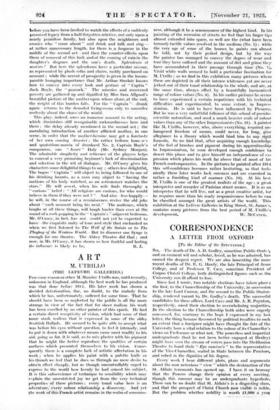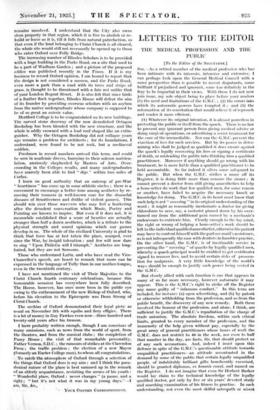CORRESPONDENCE
A LETTER FROM OXFORD
[To the Editor of the SPECTATOR.] SIR,- -The death of Dr. A. D. Godley,sOmetimepublic Orate?, and an eminent wit and scholar, loved, as he was admired, has caused the deepest regret. We are also lamenting the niore recent death's of Dr. E.' G. Hardy, the late Principal'Of Jesus College, and of Professor T. Cate, sometime President of Corpus Christi College, both distingUished figures such as the
University eon ill afford to lose. ' " - '
Since last lwrote, two notable elections have taken place : the first, to the Chancellorship of the UniVersity, in -succession to the late Lord Curzon, and the second to the Public Orator- ship, rendered vacant by Dr. Godley's death. The successful candidates for these offices, Lord Cave and Mr. A. R. Poynton, respectively, owed their election to overwhelming majorities. In the election to the Chancellorship both sides were eagerly canvassed, for, contrary to the hope I expressed in my last letter, the thing became flavoured by political loyalties to such an extent that a foreigner might have thought the fate a the University bore a vital relation to the colour of its Chancellor's views on Preference or what not.- The powerles.s and impartial undergraduate (had he not been better engaged at Henley) might have seen the stream of voters pass into the Sheldonian Theatre to hand their "Ego 110MiTIO'S " to the representative of the Vice-Chancellor, seated in State between the Proctors, and robed in the dignities of his degree.
Every week I hear different plots, plans and arguments about the now notorious " view " which the destruction of the St. Ablate ,tenements has opened _up. I have .it on. hearsay that the Powers change their opinion at every meeting, though this rumour may be an undergraduate hyperbole. There can be no dOubt that St. Aldate's is a disgusting slum, and that the prospect of Christ Church now visible is noble. But the problem whether nobility is worth £1,000 a yeal remains unsolved. I understand that the City also owns slum property in that region, which it is free to abolish or re- build or leave as it is, till it falls from natural putrefaction, so that even if the land belonging to Christ Church is all cleared, the whole site would still not necessarily be opened up to those who enter Oxford over Folly Bridge.
The increasing number of Rhodes Scholars is to be provided with a huge building in the Parks Road, on a site that used to be a part of Wadham Garden ; and a picture of the proposed edifice was published recently in the Times. if it is my business to record Oxford opinion, I am bound to report that the design is not considered a success, and the Parks Road, even more a park than a road with its trees and strips of grass, is:thought to be threatened with a fate not unlike that of your London Regent Street. It is also felt that since birds of a feather flock together, Rhodes House will defeat the aim of its founder by providing overseas scholars with an asylum from the native undergraduate whose company is supposed to be of so great an entente value.
Hertford College is to be congratulated on its new buildings.
The carved stone doorway of the now demolished Octagon Bookshop has been blended with the new structure, and the whole Is oddly crowned with a lead roof shaped like an extin- guisher. Why the Octagon Bookshop did not collapse years ago remains a problem for architects ; for its foundations, I understand, were found to be not rock, but a mediaeval midden.
Freshmen in record numbers arrived this term, and could
be seen.in academic droves, hurrying to their solemn matricu- lation, anxiously shepherded by Masters of Arts. Over- crowding in the Colleges results, and many undergraduates have scarcely been able to find " digs " within two miles of Ca-rfax.
I learn on good authority that an outcrop of pre-War
" hearti..n re ess " has come up in some athletic circles ; the is a movement to encourage a better tone among aesthetes by re- moving. their trousers (a well-known cure for the shameful diseases of Sensitiveness and dislike of violent games). This should win over those waverers who may feel a hankering after the decadent conversation which Music, Poetry and Painting are known to inspire. But even if it does not, it is meanwhile established that a score of hearties are actually stronger than half a dozen aesthetes, which is a tribute to the
physical strength and sound opinions which our games develop in us. The whole of the civilized University is glad to think that force has at last taken the place, usurped, ever since the War, by insipid toleration ; and few will now dare to sing " Upon Philistia will I tHumph." Aesthetes are long- haired, but they are not Samsons.
Those who understand Latin, and who have read the Vice- Chancellor's speech, are heard to remark that more can be expressed in the language of Tully than in our mother-tongue, even in the twentieth century.
I have not mentioned the visit of Their Majesties to the Christ Church _ fourth centenary celebrations, because this honourable occasion has everywhere been fully described. The House, however, has once more been in the public eye owing to the enthronement of the new Bishop of Oxford, who, before his elevation to the Episcopate was Dean Strong of Christ Church. _ - The urchins of Oxford demonstrated their loyal piety as usual. on November 5th with squibs and fiery effigies. There is a lot of money in Guy Fawkes even now—three hundred and twenty-odd years after his treason.
I have probably written enough, though I am conscious of many omissions, such as news from the world of sport, from the theatres, and from the musical clubs ; the completion of Pusey House ; the visit of that remarkable personality, Father Vernon, S.D.C. ; the rumours of strikes at the Clarendon Press ; the traffie problem ; the election of a new Mayor (formerly air. Exeter College man), to whom all congratulations.
catelEllwittmosphere of Oxford- through a selection of the things that Oxford does is my aim ; and I think the para- doxical nature of the place is best summed up in the remark of an elderly acquaintance, revisiting the scenes of his youth : Wonderful place, Oxford : never changes " (a pause, and a sigh) ; " but it's not what it was in my young days."—I am, Sir, &c.,
YOUR OXFORD CORRESPONDENT.















































 Previous page
Previous page